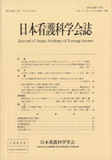Japanese
English
- 販売していません
- Abstract 文献概要
- 参考文献 Reference
- サイト内被引用 Cited by
要旨
在宅脳卒中片麻痺老人の退院後のADL変化(=調査時ADL-退院時ADL)に関与する要因を,老人及び介護者の日常生活に視点をあて,明らかにすることを目的とした.対象は,60~75歳の脳卒中初回発作の片麻痺患者33名とその家族である.分析は統計的分析と事例による分析を併用した.
結果は,以下の通りである.
1)意欲的な老人は自分の問題は自分の責任であると考え,リハビリに積極的で,退院後のADLは改善していた.
2)老人及び介護者の意識の内,老人の性役割への意識のみがADL変化と有意な相関を示した.老人が伝統的性役割に固執し,家庭内で役割を持たない時は,身体を動かす機会も少く,退院後のADLが低下しやすい.
3)介護者の介護負担が軽い老人の方が退院後のADLは改善されやすい.
4)適切な介護行動がなされている人の方が,そうで無い人より退院後のADLは改善されていた.
Abstract
We conducted a study regarding the Activity of Daily Living (ADL) of postinfarct hemiplegic aged living at home in order to clarify the factors which are associated with the change in ADL after their discharge from the hospital in terms of the daily life style of the patients and the care-providers.
The objects are thirty-three hemiplegic aged (60 to 75) after their first stroke and their care-providers. The study was conducted by collecting information at hospitals and interviews at home. Both statistical and qualitative analyses were used.
The results were as follows:
1. Highly motivated patients are more likely to think that they are responsible for themselves and they tend to be more eager in rehabilitation, thus resulting in significant improvement in ADL.
2. When patients adhere to the traditional gender roles in daily life and are not actively improved in household of, their ADL tend to deteriorate.
3. Patients who need less care from the care-providers than the others tend to have significantly more improvement in ADL.
4. Patients who are receiving adequate care tend to have significantly more improvement in ADL.
Copyright © 1991, Japan Academy of Nursing Science. All rights reserved.


